
Birds
For your pest control problems, Guaranteed Pest Control Service Co offers non-chemical and chemical control methods to treat your current issue and prevent future infestations. Help keep your home or business clear with our proactive maintenance services on a monthly, quarterly, and annual basis!
Give us a call at 503-646-2119 to discuss your pest control needs today.
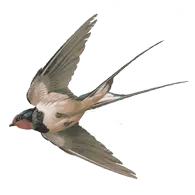
Bird Control Solutions
Bird exclusion work performed on residential, commercial and industrial buildings and complexes.
Pigeons
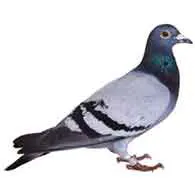
Pigeons generally have gray bodies, although sometimes they may also be white, tan, and blackish. They have a whitish rump and two black bars on the secondary wing feathers, a broad black band on the tail, and red feet. Their heads are dark with a greenish-purplish iridescence. They average about 11 inches and weigh usually around 13 ounces.
Sparrows
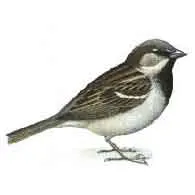
Sparrows nest in bird boxes, tree holes and in almost any nook or cranny of a building . They are aggressive fighters and will evict any nesting bird from a cavity to take over the site.
Starlings
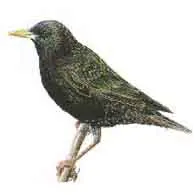
Starlings take over nesting cavities and will evict birds larger than themselves. Starlings are messy, quarrelsome, aggressive, and noisy. They gather by the thousands in their winter roosts and in the Spring nest in cavities to produce 2-3 broods.
Swallows
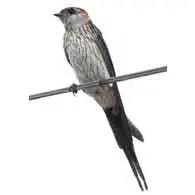
The Swallows are Coming! Contact us to learn how to keep them from nesting in your trees to begin with.
- Once nesting has occurred, it is illegal to disturb.
- Nesting costs small businesses and homeowners thousands of dollars each year in damages.
- Swallows may carry up to 60 transmittable diseases.
We have already received calls to report sightings. Swallows are migrating North!
ATTENTION: Once nesting has occurred swallows are FEDERALLY PROTECTED; nests cannot be removed until the swallows leave. We can’t do anything about the swallows living in the trees. However, we can help you learn how to keep them from nesting to begin with.
9 Interesting Facts About Pidgeons
-
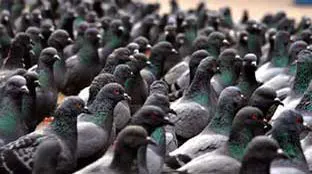
400 million pigeons worldwide
Pigeons are found in virtually every urban area of the world. There are over 400 million pigeons worldwide, and their populations have been growing as more areas become urbanized. Pigeon populations in large cities like New York City can reach 1 million birds.
-
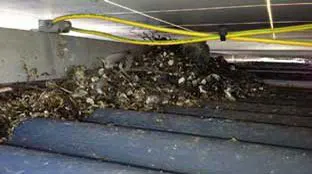
The young will leave the nest 25 to 29 days after hatching
The nests of pigeons can be found along building ledges, rafters, beams, and under bridges or inside barns. The young will leave the nest 25 to 29 days after hatching.
-
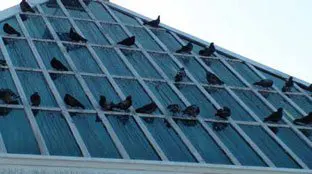
Pigeons breed during all seasons
Pigeons breed during all seasons, but they reproduce mostly in the spring and fall. A population of pigeons is typically made up of equal numbers of males and females.
-
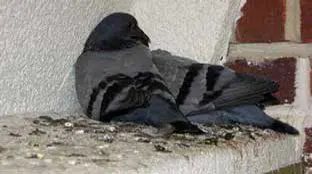
25 pounds of droppings annually
A single pigeon can produce up to 25 pounds of droppings annually. These can carry and spread diseases to both people and livestock. The droppings may also harbor airborne spores that transmit diseases—like histoplasmosis, a systemic fungus that can infect humans.
-
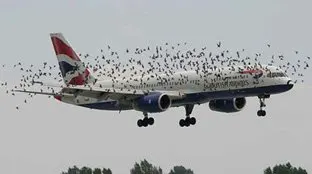
Bird-aircraft collisions
Pigeons flocking around airports can create potential bird-aircraft collisions and are considered a hazard to jet aircraft by the US Air Force.
-
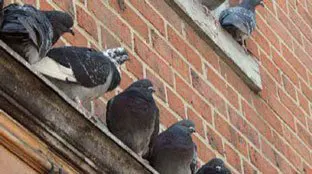
Dependent on humans for food and shelter
In urban populations, pigeons seldom live more than 3 or 4 years. The birds have grown increasingly dependent on humans for food and shelter, and for roosting, loafing and nesting.
-
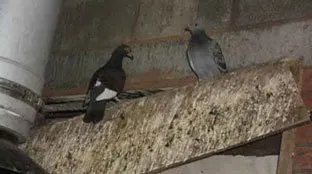
Pigeon droppings can deface and damage many surfaces
The acidic nature of pigeon droppings can deface and damage many surfaces. The droppings can also kill vegetation.
-
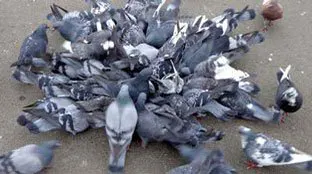
30 grams of dry food per day
Pigeons feed in flocks and will eat seeds and fruits and can subsist on street scraps. They consume about 30 grams of dry food per day , or about 10% of their body weight.
-
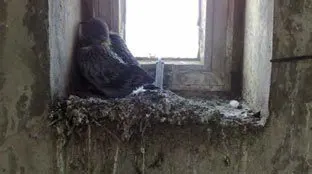
Pigeons only need 1 ounce of water per day to survive
Usually drawn to freestanding water and sometimes snow, pigeons only need 1 ounce of water per day to survive.
FAST FACTS

- Scientific Name: Columba livia
- Average weight: 9 - 13 ounces
- Average wingspan: 20-26 inches
DID YOU KNOW?
Pigeons are the number one pest bird in the United States and around the world!
Humane Pigeon Deterrents
Pigeon Spikes
are the proven anti-perching, anti-roosting bird control devices that won’t allow pigeons to land on or near them. Bird Spikes have been approved by a number of humane groups—including the U.S. Humane Society, as well as the GSA. Available in two-foot sections and 1-, 3-, 5- and 8-inch splay widths, stainless steel bird spikes feature a patented “bend-and-crush” design, so the spikes remain firmly embedded in an unbreakable UV-protected polycarbonate base. This flexible base bends a full 360 degrees, so it can easily “follow” a variety of curved mounting surfaces. Made in the USA, Stainless Steel Bird Spikes come with a 10- year guarantee.
No-Knot Bird Netting
is a heavy duty, flame-resistant polypropylene netting that effectively and humanely blocks birds from entering areas where they are not wanted. The #1 specified netting by architects, this netting is strong, light and easy to handle. It has the longest guarantee on the market (10 years) and has been tested using both the ISO 1806 and 9001 Protocol Mesh Tests.
Bird Jolt Flat Track
provides “around the clock” bird control for a wide range of applications, including ledges, rooflines, parapet walls, I-beams, eaves, signs, and any flat or curved surface where pest birds tend to perch or roost. The electric track uses behavior modification to deter pigeons and many other species. The electric jolt imparted to birds’ feet is harmless. Bird Jolt Flat Track is the only electric track bird deterrent system with patented anti-arcing design to prevent track short outs. It’s also the only system with patented glue troughs along the base to insulate the track’s conductors.
